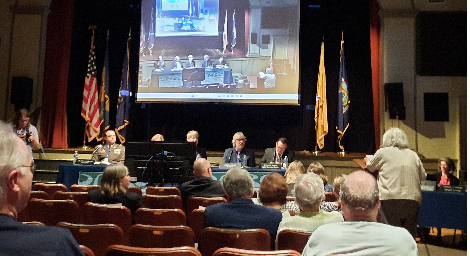Rendell Says He Supports a Drilling Moratorium Along the Delaware
September 18, 2012NY Officials Urge Gov. Cuomo to Continue Fracking Moratorium
September 18, 2012The Delaware River Basin Commission was served with a formal petition Wednesday asserting the regulatory body has an obligation to exercise its jurisdiction over the proliferation of pipelines being constructed and proposed within the boundaries of the Delaware River watershed.
According to the petition, pipelines are a significant source of waterway degradation and, according to the Delaware River Basin Compact and DRBC’s Rules of Practice and Procedure, are subject to DRBC jurisdiction, docketing and oversight.
The petition was served during the public comment period of the September 12 DRBC public meeting by Maya van Rossum, the Delaware Riverkeeper, on behalf of the membership organization the Delaware Riverkeeper Network.
“Pipelines that have been installed have already proven our point, that installation of pipelines, individually and collectively, is a hazard for the Delaware River, its streams, communities and ecosystems. With nearly a dozen new pipelines or expansions proposed to cross within the watershed boundaries in order to serve the shale gas drilling industry, we are on the cusp of a new and yet-to-be-recognized environmental hazard for our communities,” says Maya van Rossum, the Delaware Riverkeeper.
“The level of land disturbance and in-water construction the pipelines will require, the volumes of methane that pipelines are known to leak, the noisy and polluting air compressor stations pipelines bring, and the many dozens of violations recent pipelines have imposed on our environment and communities, have raised a red flag of concern for citizens and legislators alike,” van Rossum added.
Jane Davenport, Senior Attorney for the Delaware Riverkeeper Network, points out: “That the Commission has thus far refused to take jurisdiction over pipeline projects involving dozens of wetlands and stream crossings while reviewing relatively minor water withdrawals for pipeline testing is like an emergency room doctor focusing on bandaging a patient’s stubbed toe rather than preventing his imminent heart attack. The Commission must review the individual and cumulative impacts of these massive projects on the front end, before they irreversibly degrade our forests and streams.”
Before the July DRBC meeting, thirteen state legislators, the Pike County Commissioners, and thirty-two organizations including the Delaware Riverkeeper Network wrote letters urging the DRBC to exercise jurisdiction over pipelines.
According to the petition, DRBC is obliged to exercise its jurisdiction and require DRBC approval for any and all pipelines passing through the watershed. The Delaware River Basin Compact, which provides for the mission and mandates of the DRBC, obligates the Commission to review all projects with substantial effects on the water resources of the Basin for consistency with their Comprehensive Plan.
“The level of land disturbance, and the invasiveness of the tributary and wetland crossings associated with these pipelines are significant and would most certainly have an impact on the water resources of the Delaware River Basin. There are no limitations or exceptions within the DRBC Compact or its Rules of Practice or Procedure that would exempt pipelines from DRBC jurisdiction,” van Rossum says.
Furthermore, according to the petition, pipelines proposed and in general, individually and cumulatively:
— Will include “significant disturbance of ground cover affecting water resources;”
— Have already been referred to the DRBC by the National Park Service for action under the Rules of Practice and Procedure;
— Will affect reaches of the Delaware River designated as Special Protection Waters, which, according to DRBC regulations, cannot be degraded; and
— Could “pass in, on, under, or across … recreation project areas as designated in the Comprehensive Plan” of the DRBC such as the Delaware Water Gap National Recreation Area.



